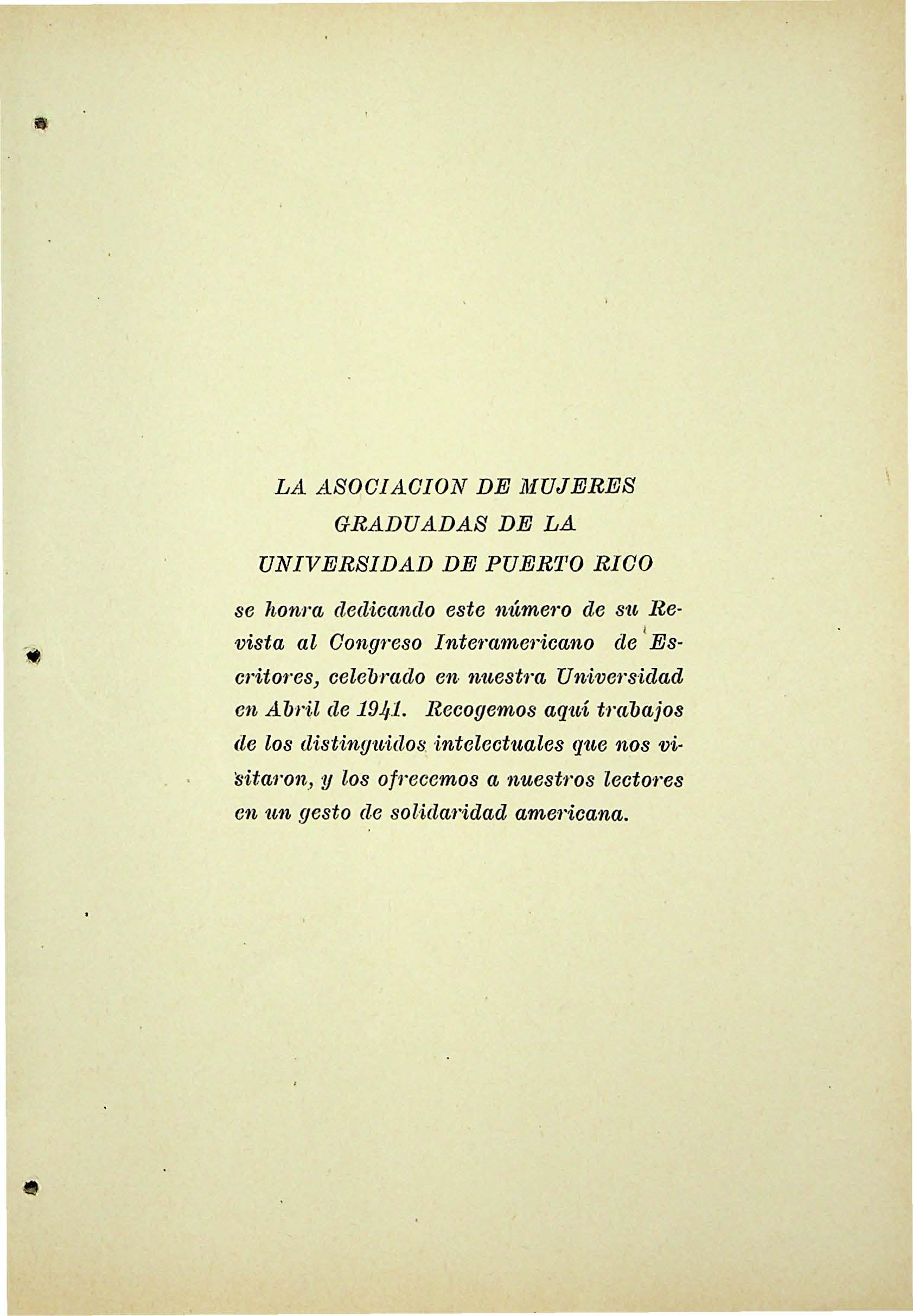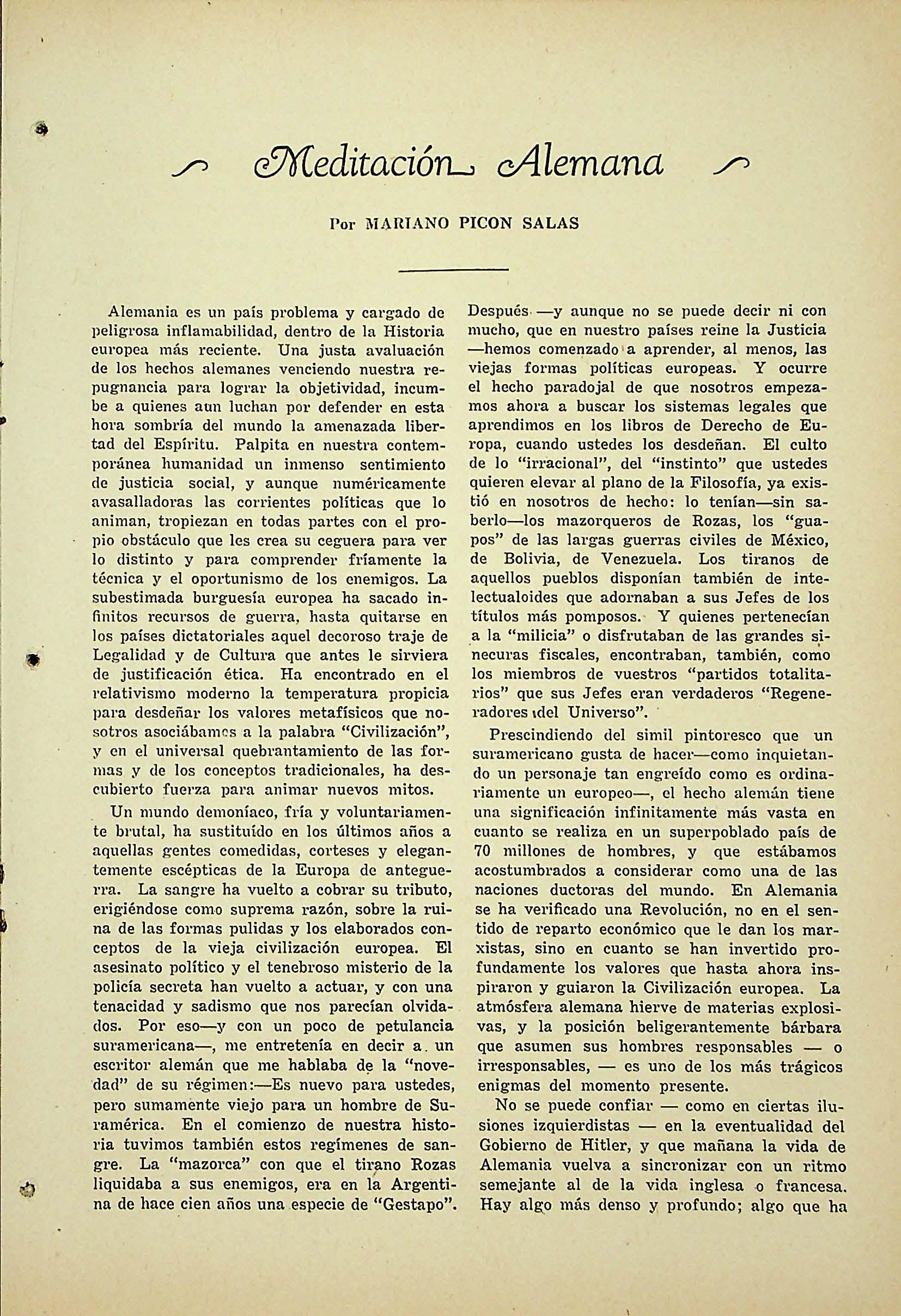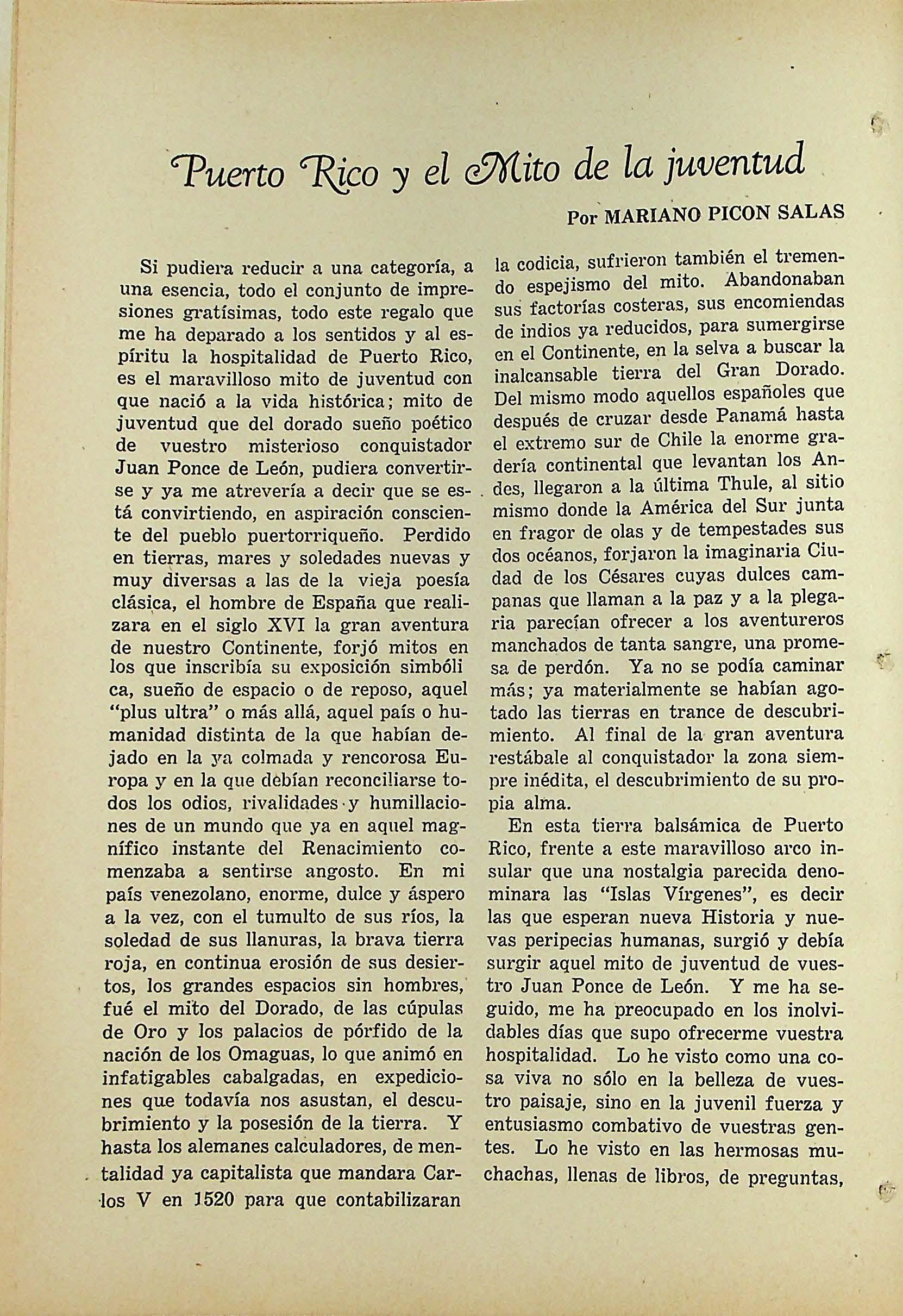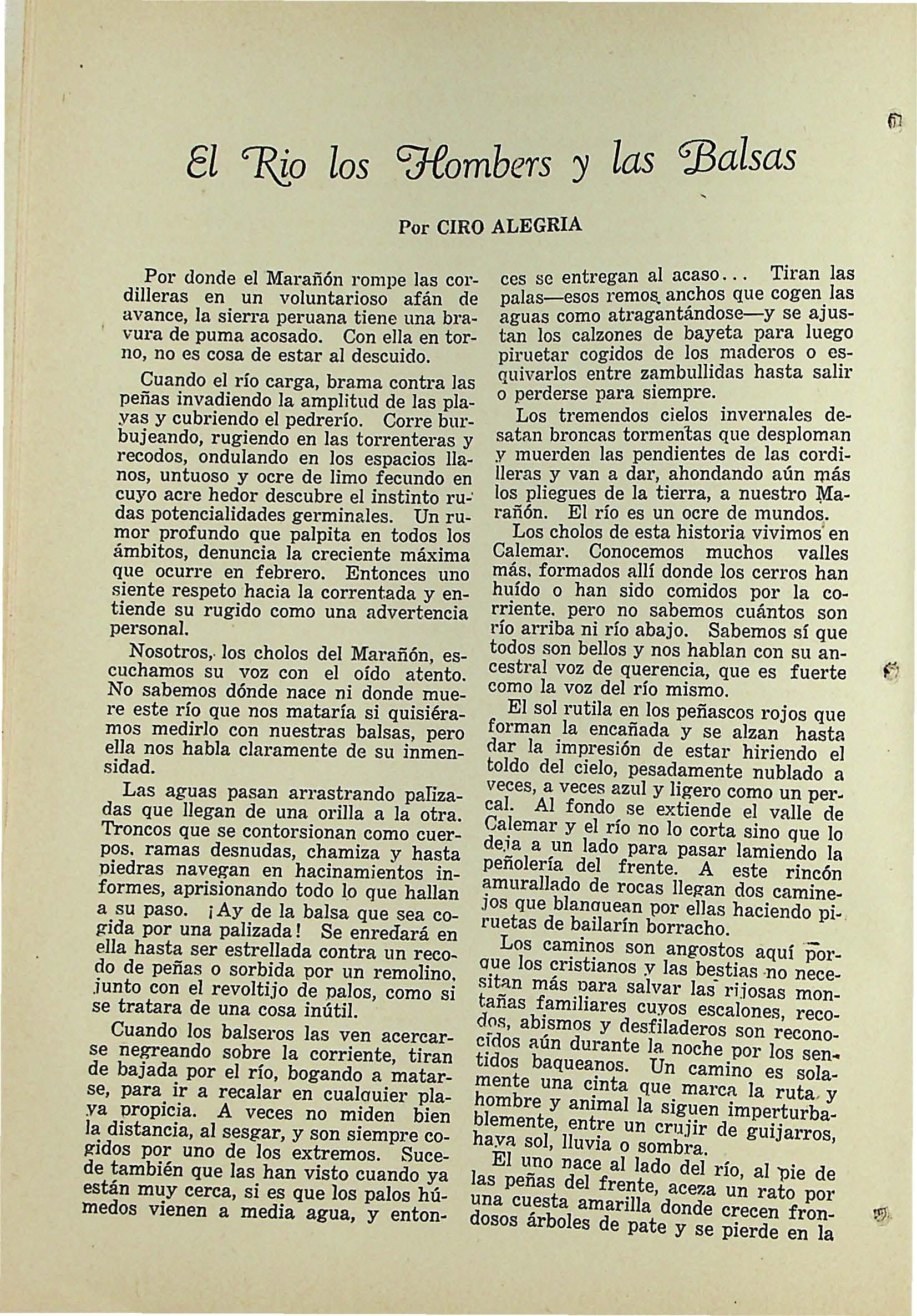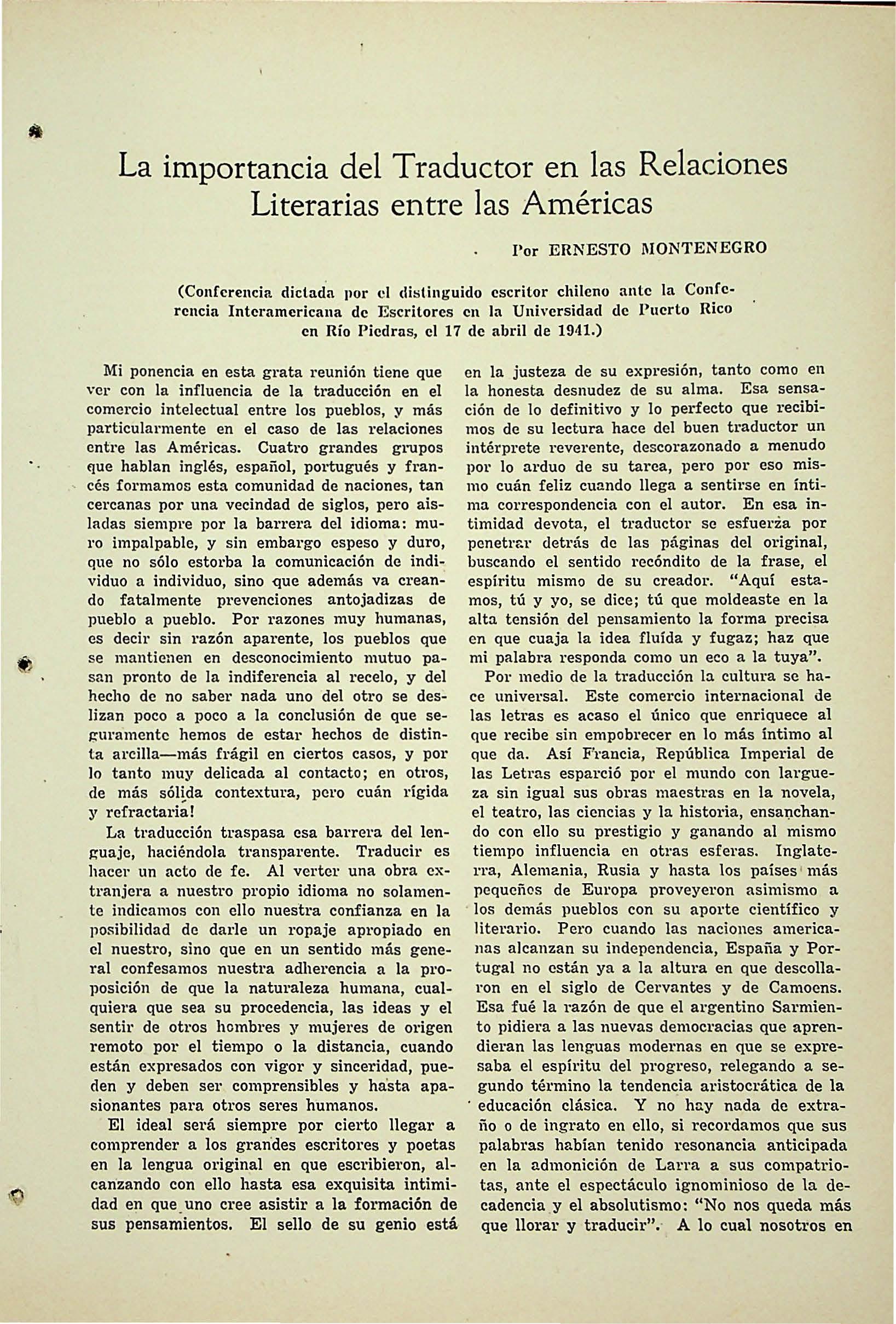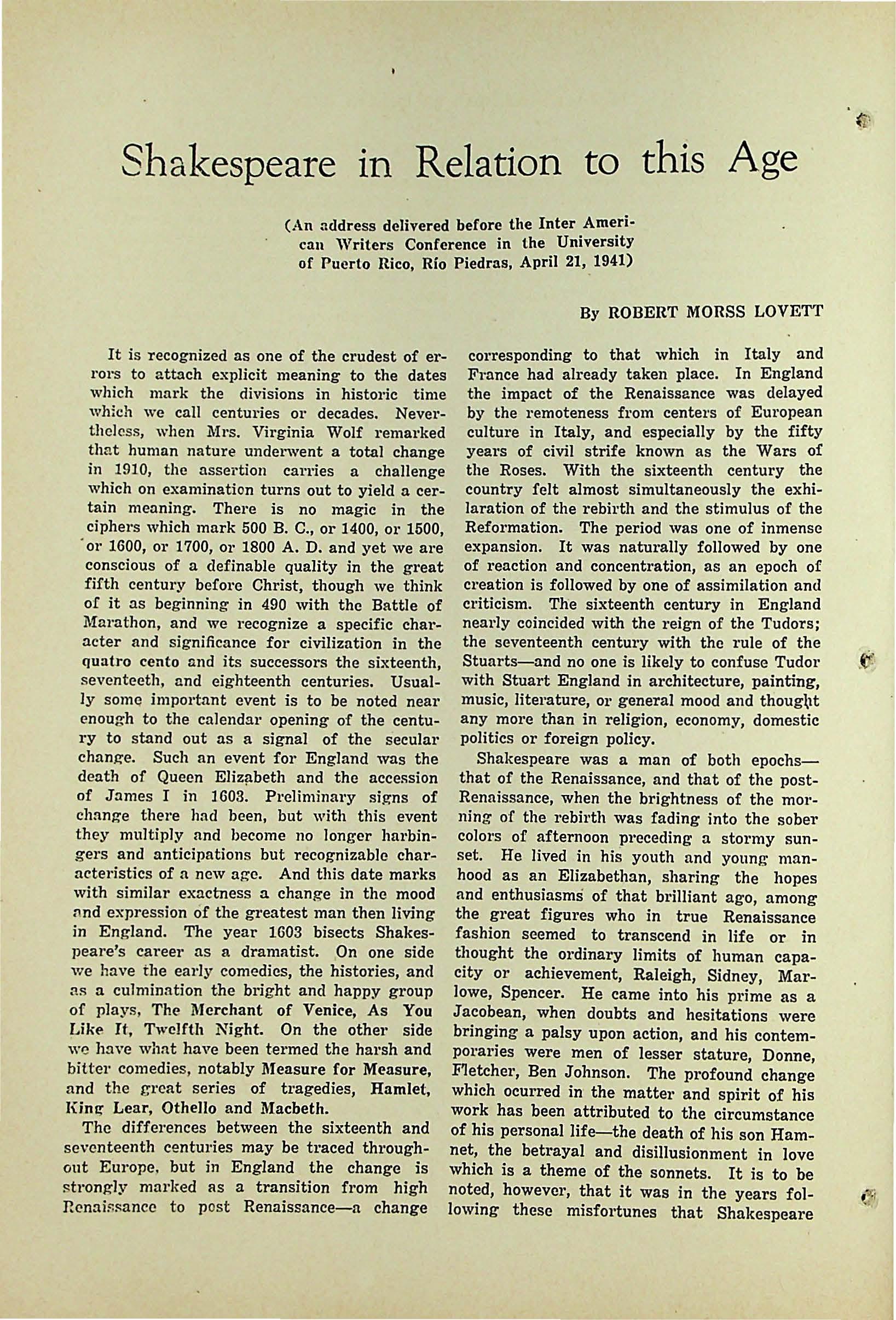
9 minute read
An Informal Discussion of Poetic Form William Carlos Williams
An Infonnal Discussio.n of Poetic Form
(Text of Dr. Williams' talle before ·the lnter American Writers Conferencc in thc Thcatrc of thc University of Puerto Rico, Wcdnes· day cvening, A11ril 16)
By Williams Carlos Williams
PREAMBLE been deformed-as much so as were the feet of Chinese women, formerly, to inThe difficulty as this informal. is to keep such a talk dicate their Thus we aristocracy. have two statments- the After ali, there is no great point at poem is or is not relatecl to the structuissue. to look We at are here for the most part each other, to recognize in ral character poem in itself of its own constitutes age and the the history of each called other-that a write1·, to curious complexity encourage ancl to the mind.
To carry the argument still further learn. But most to try to fincl a means, Jet me insist that the poem presents through the art which we practice, to the history of the mind in any age pricommunicate with each other - for marily by its structure-which, if the what may come of it. poem is to matter at ali, will represent
The study of poetry is basecl still in sorne particular the true structure of largely on metaphysical criteria. This that age which produces it. makes for as many approaches to any What we need in verse today is a given poem as there are schools or atgreat technician. titudes of thought in the world. We need one who can hear the "norThis richness may have its reward's mal" language and who knows the patbut it is likely to cause a great confu- terns of the past to forget them. Then sion in the mind of the student. What to invent, that is, to rediscover in the should be our basic attitude towarcl a vernacular about him, as a fresh inpoem, any poem, there, lying on the sight, the simple elements that, also, page? It is acceptable, repellant? Is made up the old rigidities-and reinteit a work of art or a sub-mental impergrate them among the living material tinence
Upon or both? what shall a juclgement be into adequate modern enough to include the forms whole expansive armamen- .based? I{ we can get to that we can get to something we can unclerstand totarium of the mind as we know it day, -forros uncrampecl, unclipped, toun- gether.
A beginning is made towarcl a claricompressed structurally into those past "aristocracies" which are today damnfication among this swarming mixture able in their deforming limitations. of approaches by cutting across ali ca- The Janguage is the thing. The lantegories and declaring flatly: guage must not be deformed to fit the
Every poem is or is not related to the pattern of the verse. The verse must structural character of its own age. be transformed to fit the exigencies of Then I would go on to say: that unless the language. a poem is so related it has already lost .By debased rigidities of pattern, if its primary opportunity and signifiwe are not careful, om· vehicle of com- cance. munication, our language, will be falsi
Drop that there and Jet me make an- fied and if in its structure, you may be other statement: · sure in its meaning also. We are like
The arts are 'really the history of the ly to be made to say what we do not inmind. If they are cramped or inadetend and to come off brutalized thereby. quate the mind will be found to have · Let us remember, the elements of
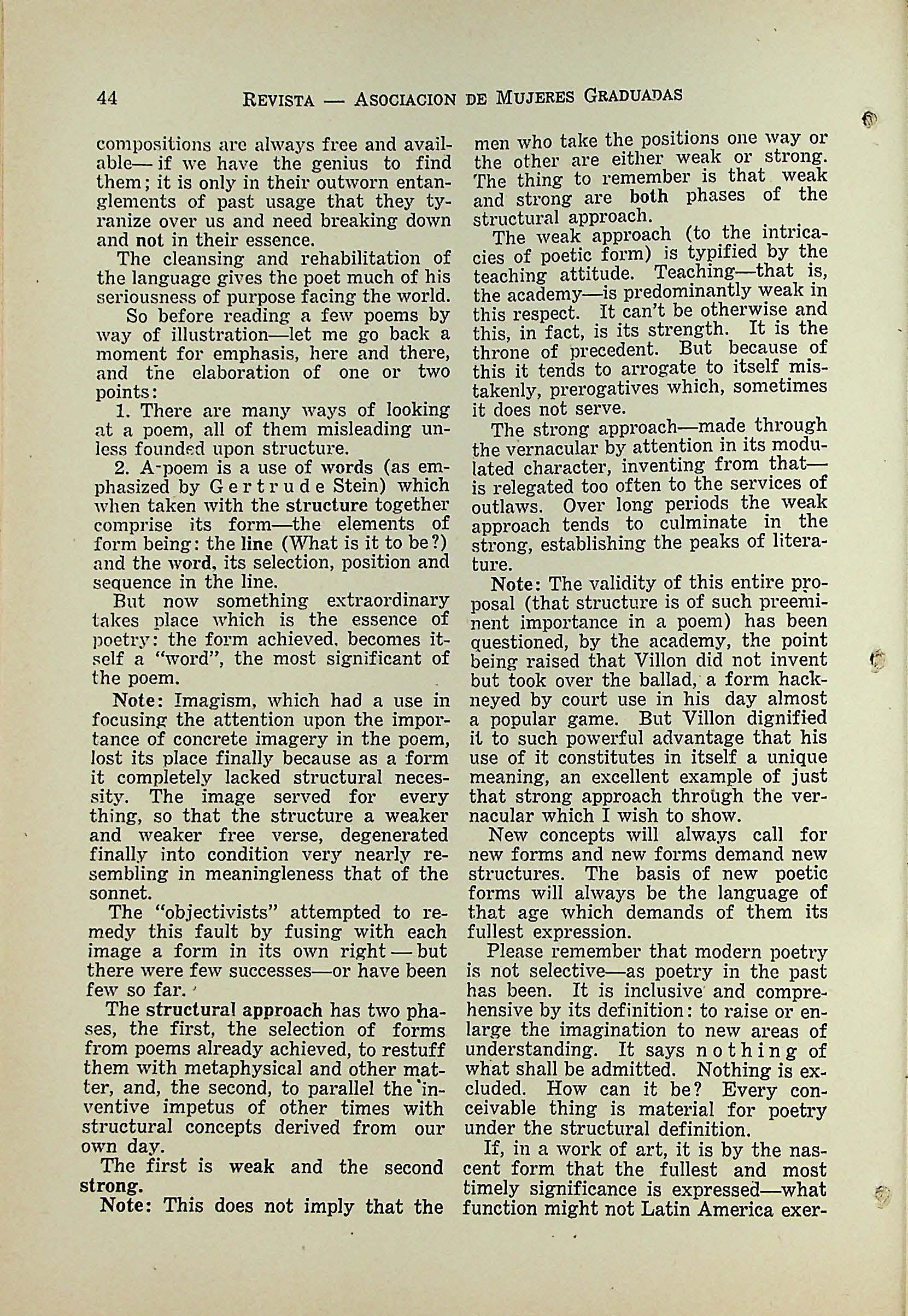
compositions are always free and available- if we have the genius to find them; it is only in their outworn entanglements of past usage that they tyranize over us and need breaking down and not in their essence.
The cleansing and rehabilitation of the language gives the poet much of his seriousness of purpose facing the world.
So before reading a few poems by way of illustration-Iet me go back a moment for emphasis, here and there, and ti:Ie elaboration of one or two points: men who take the positions one way or the other are either weak or strong. The thing to remember is that weak and strong are both phases of the structural approach. . .
Note: focusin¡r !magism, which had a the attention upon the use in imporneyed by a popular court use in game. But bis day almost Villon dignified tance of concrete imagery in lost its place finally because the poem, as a form it to such powerful aclvantage that his use of it constitutes in itself a unique it completely lacked structural sity. The image served for neces- every meaning, an excellent example of that strong approach throbgh the just ver- thing, so that the structure a weaker nacular which I wish to show. and weaker free verse, degenerated New concepts will always call for finally into condition very nearly re- new forms and new forms demancl new sembling in meaningleness that of the structures. The basis of new poetic sonnet. forms will always be the Ianguage of
The "objectivists" attempted to re- that age which demands of them its medy this fault by fusing with each fullest expression. image a form in its own right - but Piense remember that modern poetry there were few so far. few , successes-or have been is not selective-as poetry in has been. It is inclusive· and the past compreThe structural approach has two pha- hensive by its definition: to raise or en- ses, the first, the selection of forms large the imagination to new areas of from them poems already achieved, to restuff with metaphysical and other matunderstanding. It says what shall be admitted. n o t h i n g Nothing is of ex- ter, and, the second, ventive impetus of to parallel the 'in- other times with cludecl. ceivable How can thing is it be? material Every con- for poetry structural concepts derived from our own day.
The first is weak and the second strong.
Note: This does not imply that the under the structural definition.
The weak approach (to the mtr1cacies of poetic form) is typified by teaching attitude. 1_s, the academy-is predommantly weak m this respect. It .can't be otherwis.e and this, in fact, is 1ts strength. It rs the throne of precedent. But _of this it tends to arrogate to rtself mrs- takenly, prerogatives which, sometimes l. There are many ways of looking at a poem, ali of them misleading un- less foundf:d upon structure. it does not serve.
The strong approach-made through the vernacular by attention in its modu2. A-poem is a use of words (as em- iated character, inventing from thatphasized by G e r t r u d e Stein) which is relegated too often to the services of when taKen with the structure together outlaws. Over long periods the weak comprise its form-the elements of form being: the line (Wbat is it to be?) approach tends to strong, establishing culminate in. the the peaks of htera:md the word, its selection, sequence in the line. position and ture.
Note: The validity of this entire proBnt takes now JJlace something extraordinary which is the essence of posal nent (that structure is of such preemiimportance in a poem) has been poetry self a : the form achieved. becomes "word", the most significant itof questioned, by the academy, the point being raised that Villon did not invent the poem. but took over the bailad, · a form hack
If, in a work of art, it is by the nas- cent form that the fullest and most timely significance is expressed-what function might not Latin America exer-
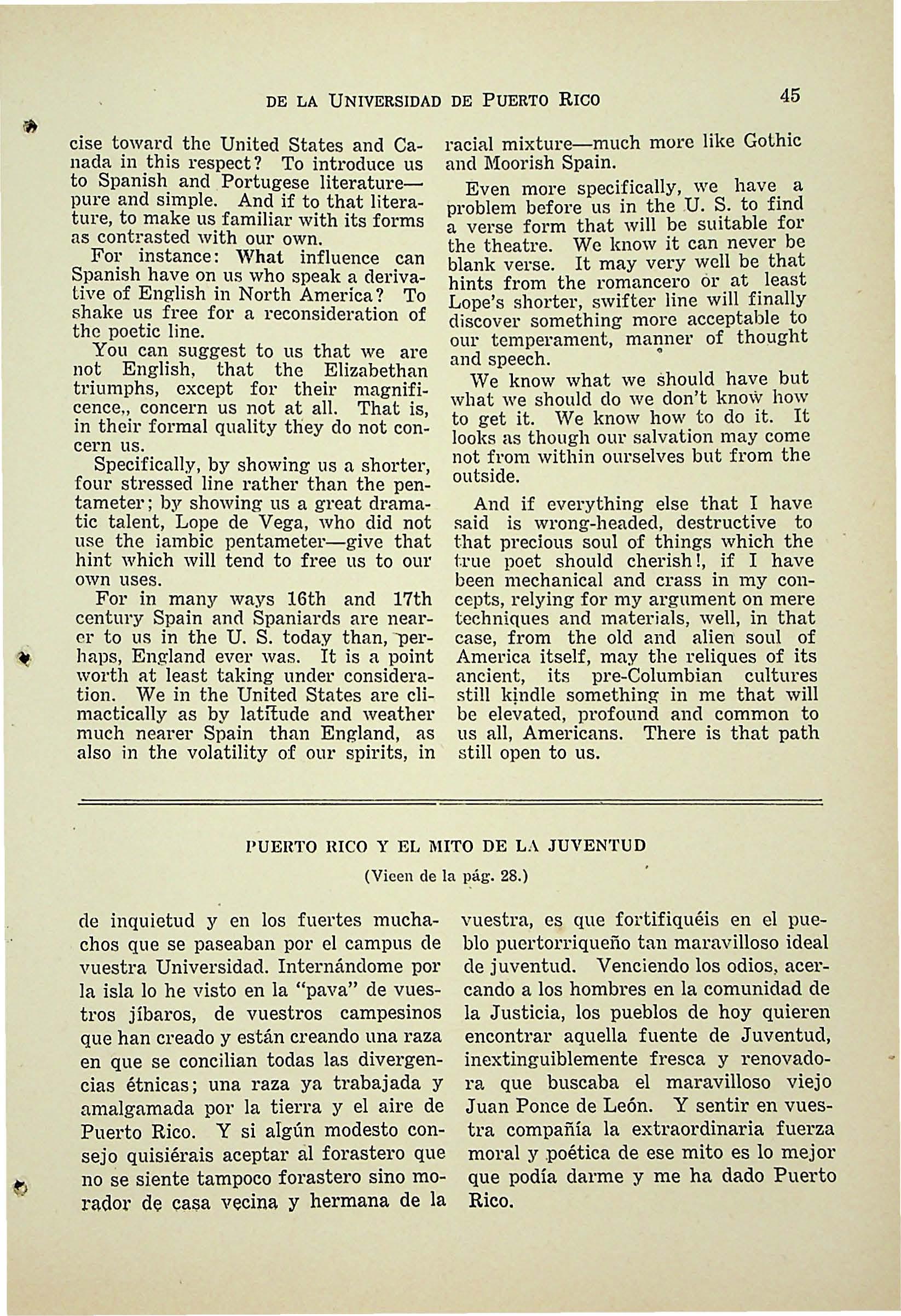
cise toward the United States and Garacial mixture-much more Iike Gothic nada in this respect? To introduce us and l\foorish Spain. to Spanish and Portugese Iiteraturepure and simple. And if to that literature, to make us familiar with its forms as contrasted with our own.
For instance: What influence can Spanish have on us who speak a derivative of English in North America? To shake us free for a reconsideration of thc poetic line.
You can suggest to us that we are not English, that the Elizabethan triumphs, cxcept for their magnifi- cence,, concern us not at ali. That is, in their formal quality tliey do not con- cern us.
Specifically, by showing us a shorter, four stressed Iine rather than the pen
Even more specifically, we have a problem before us in the U. S. to find a verse form that will be suitable for the theatre. We know it can never be blank verse. It may very well be that hints from the romancero ór at least Lope's shorter, swifter Iine will finally discover something more acceptable to our temperament, manner of thoµght and speech. •
We know what we should have but what we should do we don't kno\v how to get it. We know how to do it. It looks as though om· salvation may come not from within olll"selves but from the outside. tameter; by showing us a great dramaAnd if everything else that I have tic use talent, Lope the iambic de Vega, who did not pentameter-give that said that is wrong-headed, destructive precious soul of things which to the hint which will tend to free us to our 1:rne poet should cherish !, if I have own uses. been mechanical and crass in my con-
For in many ways 16th and 17th cepts, relying for my argnment on mere century Spain ancl Spaniards are near- tcchniques and materials, well, in that er to us in the U. S. today than, lJercase, from the old and alien sonl of haps, England evcr was. It is a point America itself, may the reliques of its worth at least taking under consideraancient, its pre-Colnmbian cultures tion. We in the United States are clistill k[ndle something in me that will mactically as by latítude and weather be elevated, profonnd and common to much nearer Spain than England, as us ali, Americans. There is that path also in the volatility of our spirits, in still open to us.
PUERTO meo y EL MITO DE LA JUVENTUD
(Vicen de la pág. 28.)
de inquietud y en los fuertes muchachos que se paseaban por el campus de vuestra Universidad. Internándome por la isla lo he visto en la "pava" de vuestros jíbaros, de vuestros campesinos que han creado y están creando una raza en que se concilian todas las divergencias étnicas; una raza ya trabajada y amalgamada por la tierra y el aire de Puerto Rico. Y si algún modesto consejo quisiérais aceptar ál forastero que no se siente tampoco forastero sino moradol' de ca¡¡a vecina y hermana de la vuestra, es que fortifiquéis en el pueblo puertorriqueño tan maravilloso ideal de juventud. Venciendo los odios, acercando a los hombres en la comunidad de la Justicia, los pueblos de hoy quieren encontrar aquella fuente de Juventud, inextinguiblemente fresca y renovadora que buscaba el maravilloso viejo Juan Ponce de León. Y sentir en vuestra compañía la extraordinaria fuerza moral y .poética de ese mito es lo mejor que podía darme y me ha dado Puerto Rico.

